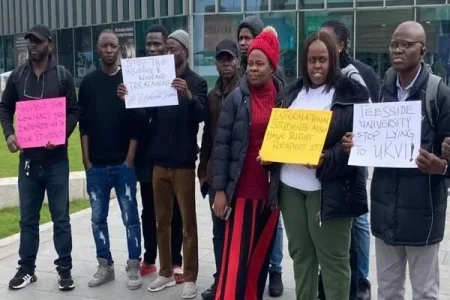 Teesside University expelled many Nigerian students over unpaid fees, sparking protests. Students accused the university of being heartless despite efforts to set up payment plans. The expulsions were due to visa compliance rules. Affected students shared stories of being midway through studies when expelled and now facing deportation.
Teesside University expelled many Nigerian students over unpaid fees, sparking protests. Students accused the university of being heartless despite efforts to set up payment plans. The expulsions were due to visa compliance rules. Affected students shared stories of being midway through studies when expelled and now facing deportation.In a heart-wrenching turn of events, Teesside University in the United Kingdom has ignited a firestorm of controversy by expelling numerous Nigerian students and initiating their deportation over unpaid tuition fees. The institution has cited its obligation to comply with strict UK immigration regulations as the driving force behind this contentious decision, leaving affected students devastated and their futures hanging in the balance.
As the news reverberated across the university's campus, anguished Nigerian students took to the streets in protest, their voices carrying the weight of shattered dreams and an overwhelming sense of injustice. They condemned what they deemed a "heartless" and unfair act by the university administration, accusing the institution of disregarding their plight.
Adenike Ibrahim, one of the affected students, shared her harrowing tale of being on the cusp of submitting her dissertation when she was abruptly removed from her course due to an inability to make a payment. Despite having since paid her fees in full, Ibrahim now faces deportation, forced to uproot her life and that of her young son, with no prospect of re-enrolling in her studies.
The university, however, maintained that it had "no choice" but to enforce these measures, as non-payment of fees constituted a breach of visa sponsorship rules. A spokesperson defended the institution's actions: "Teesside University is proud to be a global institution with a diverse student population but is also very aware of its visa issuance and compliance obligations."
Esther Obigwe, another affected student, recounted her futile attempts to communicate her financial struggles to the university authorities. "I attended all of my classes and seminars, I'm a hell of an active student," she said, her voice trembling with emotion. "It is disheartening, I am now on antidepressants and being here alone, I have nobody to talk to. For over two months, I've barely eaten or slept, and I don't understand why this is being meted at us; we didn't do anything wrong."
Jude Salubi, who was midway through a placement to become a social worker, was in a similarly dire predicament. His access to the university was suspended, and he was ordered to leave the country, despite having already paid a substantial portion of his fees. "As of now, I have paid £14,000 and have a balance of £14,000," Salubi revealed. "I am willing to agree on how I will make this payment, but I need guarantees that I will be re-enrolled into school and my visa restored."
The UK Home Office's stance on the matter was unequivocal, stating that the decision to offer or withdraw visa sponsorship rested solely with the sponsoring institution. When a visa is shortened or canceled, individuals must "take steps to regularize their stay or make arrangements to leave the UK," leaving the affected students with no right to appeal.
As the Nigerian Government remains silent on this unfolding crisis, the plight of these students highlights the immense challenges faced by international students, particularly those from developing nations, in affording the soaring costs of Western education. Their stories serve as a poignant reminder of the delicate balance between institutional financial realities and the human toll of such decisions.
In the face of adversity, these resilient Nigerian students cling to hope, their voices echoing a desperate plea for compassion and a chance to continue their pursuit of knowledge and a better future.




